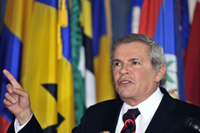- English
Lecture Series
Forty First Lecture
Forty First Lecture - September 14, 2010
“Perspectives from City Hall: Better Cities for Better Lives”
Speakers:
Oscar Luis Castañeda, Mayor of Lima, Perú
Desmond McKenzie,
Mayor of Kingston, Jamaica
Enrique Peñalosa,
Former Mayor of Bogotá, Colombia
Highlights from the Lecture
Mr. Desmond McKenzie started his speech by pointing out that he was
honored to be invited to participate in the Lecture. He mentioned that safer
cities are cities in which citizens not only feel secure from excessive crime
and violence, but also protected by infrastructural and environmental
security.
Kingston, which boasts an enormous commercial area and the finest natural
harbor in the world, has experienced outflow of investors, because it has been
overrun by large number of migrants seeking better opportunities. The rapidly
expanding population and the burden of resources such as lack of schools and
jobs limited the development of the city and drug dealing, crime and violence
became a part of many people.
To overcome this difficult situation, the current administration, of which Mr.
McKenzie is a part, has been implementing key strategies and actions under the
Security and Justice Components of Vision 2030. Mr. McKenzie explained that
this plan includes training police officers to create a partnership with
citizens; launching the Transnational Crime and Narcotics Division to deal
with the trafficking of drugs and firearms; passing six crime bills to assist
the police in dealing with the most dangerous criminals; and forming a
Municipal Police and working on the creating the Municipal Court. Since then,
murder has been down by 36% when compared with the corresponding period last
year and 48% when compared with the preceding three months of this year.
Now Kingston is trying to foster development and growth of the city. The
project has already started and includes implementing a number of social
intervention programs for residents from volatile areas in the city;
initiating skill training programs such as food preparation, office
administration and cosmetology; refurbishing city’s main park; and building
the Kingston Multimodal Transportation Center, Market District, Trade Center
and Cultural Square.
Finally, Mr. McKenzie emphasized that the new paradigm for generating
prosperity is the development of country’s higher forms of capital – the
cultural, human, knowledge and institutional capital stocks – coupled with the
reduction of inequality, which will move the society to the higher stage of
development.
The second speaker, Mr. Enrique Peñalosa, started by highlighting the
importance of urban security as a right for living without fear, which is
fundamental for a good quality of life. However, in his opinion, the lack of
legitimacy because of corruption and inequality in Latin America and the
Caribbean countries makes it difficult to build a secure city, since this
hinders authorities to penalize crimes. Mr. Peñalosa clarified that legitimacy
is the perception of citizens that their society is fair and impartial.
In this sense, Mr. Peñalosa presented two main policy pillars to obtain
legitimacy, as well as security, which were practiced in Bogota during his
administration. On the one hand, he tried to improve the perception of
integrity of the city, which meant an honest government without corruption.
Mr. Peñalosa also stressed the importance of the law enforcement without any
special concession contrary to general interests.
On the other hand, Mr. Peñalosa proposed promoting equality as an instrument
for urban security. This meant not a simple transfer of food and money to the
poor, but the enhancement of self-esteem and self-confidence of the poor. For
example, he mentioned that the new, clean and modernized pedestrian walk and
public transportation offer the poor the feeling that they are the most
important and respected; new parks, libraries and schools in marginalized
areas send a message that their education and young people are important. He
claimed that having a soccer field is more effective and positive than a
police station” because it provides a public space for students and families
to have a good time and know each other in a peaceful environment.
To conclude, Mr. Peñalosa demanded to reject materialism for the integration
of the citizens and to give priority to human beings in order to protect and
respect them and to give them every opportunity.
The third speaker, Mr. Oscar Luis Castañeda, pointed out the importance
of competitiveness for cities in a globalized world. He confirmed that, to
achieve those values, the cities with scarce resources like Lima have to
consolidate and strengthen their infrastructure and quality of life, which
means more culture, more public attention for health and no indifference as
well as social inclusion.
Mr. Castañeda demonstrated how Lima could overcome some obstacles and
challenges. In Lima, the Social Club was built where families get together to
use the swimming pool and the gym; Health Buses, which is created by the
combination of the public and private fund, attend citizens more economically
and closely than any other social services; students can learn using computers
with computing buses; the public transportation like buses runs with gas in
order to prevent pollution; and there is a municipal ballet and there are
theaters in the marginalized area of the city.
Mr. Castañeda stressed that urban security can be achieved by enhancing
culture and social inclusion. He also insisted that cities have to be a
society with high quality of life and to generate human development.



